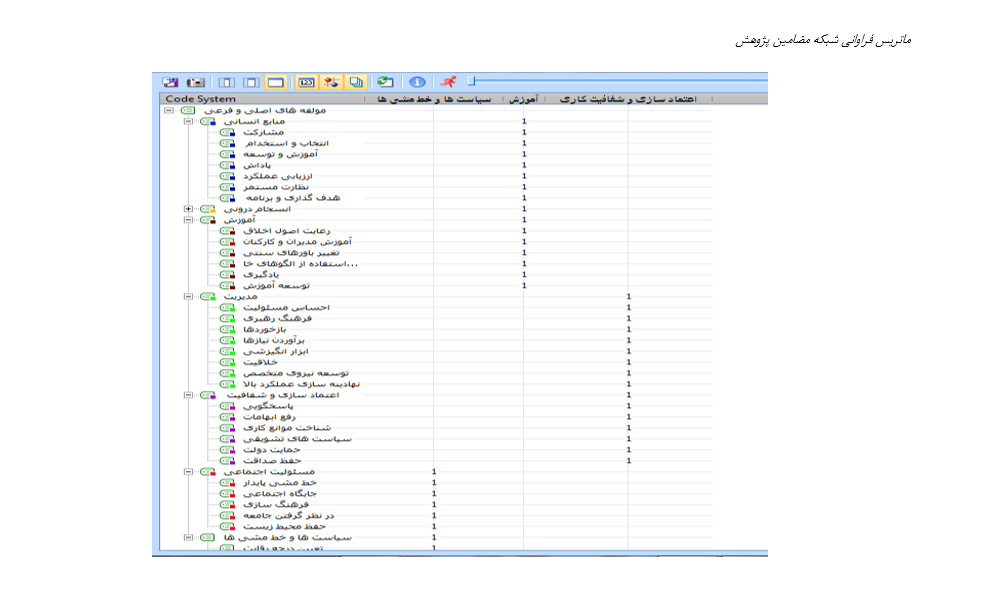Performance Management Model of Policy Studies System in Iran's Geography (Case Study: Research Center of the Islamic Consultative Assembly)
Keywords:
Performance, Policy Studies System, Research Center of the Islamic Consultative Assembly, Human Resources, Schematic ModelAbstract
The present article seeks to address the issue of performance management of the policy studies system. Using qualitative research methods, the performance model is designed based on themes and codes extracted from interviews with experts associated with the policy studies system. This article is a mixed-methods research study and is applied in nature from the perspective of its objective. The statistical population of the quantitative part of this research comprises 123 executive experts, and the structural-interpretive modeling method is used to design the model. The article's findings reveal that the themes of the performance management model include policies and guidelines, social responsibility, trust-building and transparency, management, training, human resources, and internal coherence. According to the structural-interpretive modeling calculations, "training" is identified as an independent exogenous variable that is unaffected by any other variable in the model. Policies and guidelines are endogenous variables, while "human resources" are dependent variables. Additionally, the variable of management serves as a mediating role.
Downloads
References
Abbasi, H., & Daneshfard, K. (2021). Citizen Participation Model in the First Stage of Public Policy-Making (Identifying Public Issues). Interdisciplinary Studies of Strategic Knowledge Quarterly(42), 247-270. https://smsnds.sndu.ac.ir/article_1463.html?lang=en
Ahadzadeh, A., Sayyadshirkoosh, S., & Jamshidi Ivanki, M. (2020). Factors Affecting the Effectiveness of Public Policy Implementation. Energy Policy and Planning Research Quarterly, 6(21), 167-205. https://jppolicy.ut.ac.ir/article_81989.html?lang=en
Lotfi, H., Daneshfard, K., & Mousakhani, M. (2020). Comparative Study of the Role of Non-Governmental Organizations in the Public Policy-Making Process of Iran and Selected Countries. Strategic Studies of Public Policy Quarterly(36), 164-183. https://sspp.iranjournals.ir/article_243112.html?lang=en
Mahdavian Sadr, M., Daneshfard, K., & Givarian, H. (2018). Presenting a Conceptual Model for Performance Management of Policy Research Institutes (Case Study: Research Center of the Islamic Consultative Assembly). Islamic-Iranian Progress Model Quarterly, 9(20). https://www.ipoba.ir/article_143011.html?lang=en
Memarzadeh Tehran, G., Mirsapasi, N., & Jalili, S. (2011). Providing a Model for Evaluating the Effectiveness of Implementing Public Policies of the Islamic Republic of Iran in the Health and Treatment Sector. Public Policy-Making in Management Quarterly, 2(4), 19-31. https://www.ipoba.ir/article_143011.html?lang=en
Miri, S. M., Khosropanah, A., Hamidizadeh, A., Akhavan Alavi, S. H., & Rahmati, M. H. (2018). In Pursuit of Integration in the Public Policy-Making System: The Unified Governance and Public Policy Model. Strategy Quarterly(86), 159-192. https://www.sid.ir/paper/89093/en
Pour Ezzat, A. A., Gholipour, A., Bagheri, M. a.-H., & Nadaf, M. (2011). Examining the Impact of Globalization on the Trade Policy-Making System of the Islamic Republic of Iran. Business Management Quarterly, 3(10), 35-54. http://ensani.ir/fa/article/7823/%D8%A8%D8%B1%D8%B1%D8%B3%DB%8C-%D8%AA%D8%A7%D8%AB%DB%8C%D8%B1-%D8%AC%D9%87%D8%A7%D9%86%DB%8C-%D8%B4%D8%AF%D9%86-%D8%AA%D8%AC%D8%A7%D8%B1%D8%AA-%D8%A8%D8%B1-%D8%A7%D9%86%D8%AF%D8%A7%D8%B2%D9%87-%D8%AF%D9%88%D9%84%D8%AA-%D8%AF%D8%B1-%D8%A7%DB%8C%D8%B1%D8%A7%D9%86
Rezghi Rostami, A. (2000). Implementation, the Missing Link in the Public Policy Process. Management and Development Process Quarterly, 14(50), 51-62. https://www.researchgate.net/publication/229799610_The_Implementation_of_Public_Policy_Still_the_Missing_Link
Rostamloo, R., Nargesian, A., & Manourian, A. (2018). Identifying Inhibiting Factors of Council-Based Policy-Making in Iran; Case Study: Supreme Administrative Council. Public Policy Quarterly, 4(4), 75-90. https://jppolicy.ut.ac.ir/article_69718.html?lang=en
Zand, A., & Najafi, A. (2021). Identifying Components of Auditor Behavior Based on Social Capital Using a Combined Delphi, Fuzzy, and ISM Method. Audit and Management Accounting Knowledge Quarterly, 10(38), 145-158. https://www.jmaak.ir/article_17260.html?lang=en

Downloads
Published
Submitted
Revised
Accepted
Issue
Section
License
Copyright (c) 2025 Journal of Technology in Entrepreneurship and Strategic Management (JTESM)

This work is licensed under a Creative Commons Attribution-NonCommercial 4.0 International License.










